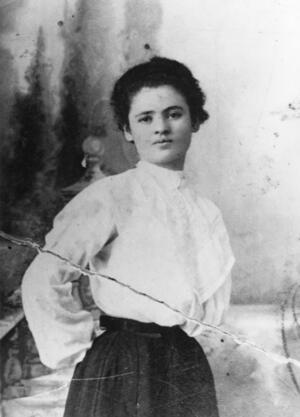Wage Earners' League for Woman Suffrage holds first mass rally
The year-old Wage Earners' League for Woman Suffrage held its first mass rally on April 22, 1912, at New York's Cooper Union's Great Hall of the People. Founded by the young veteran organizers Clara Lemlich, Rose Schneiderman, and three others, the League sought to encourage working women to join the political process as well as to agitate for the right to vote. Lemlich, a shirtwaist maker, became the League's vice president.
Drawing on their background in the Socialist movement, the founders of the Wage Earners' League emphasized the special concerns of working women. They argued in speeches and pamphlets that women needed the vote in order to secure basic human rights like safe working conditions. In doing so, League leaders came into conflict with both Socialist men and middle-class women. The men who counted on female allies in Socialist causes bluntly suggested that suffrage activists return to their kitchens. Middle-class women showed their class bias in suggesting that their wealth and education made them more capable activists than these working women. Wary of having their specific concerns sidestepped, League members agreed that any woman could join their group, but that only workers could vote, ensuring that working women would remain in control of the League's agenda and tactics.
The April 22, 1912, Cooper Union rally brought together thousands of cheering women to listen to arguments for women's suffrage. The location was symbolic; Cooper Union was the site of the rally that had kicked off the "Uprising of the 20,000," one of the first and most influential strikes of industrial garment workers, just three years before. Despite a large and enthusiastic turnout at the rally, the League dissolved soon afterward. Lacking a full-time organizer and a steady source of funding, the League ceased to be active. Schneiderman went on a speaking tour for another suffrage organization; her colleagues likewise turned their energies to other groups. Ultimately, the fight for suffrage would depend on alliances across class and gender lines.
Sources: Annelise Orleck, Common Sense and a Little Fire: Women and Working-Class Politics in the United States, 1900-1965 (Chapel Hill, 1995); New York Times, April 23, 1912.




GIRL POWER!!!!!